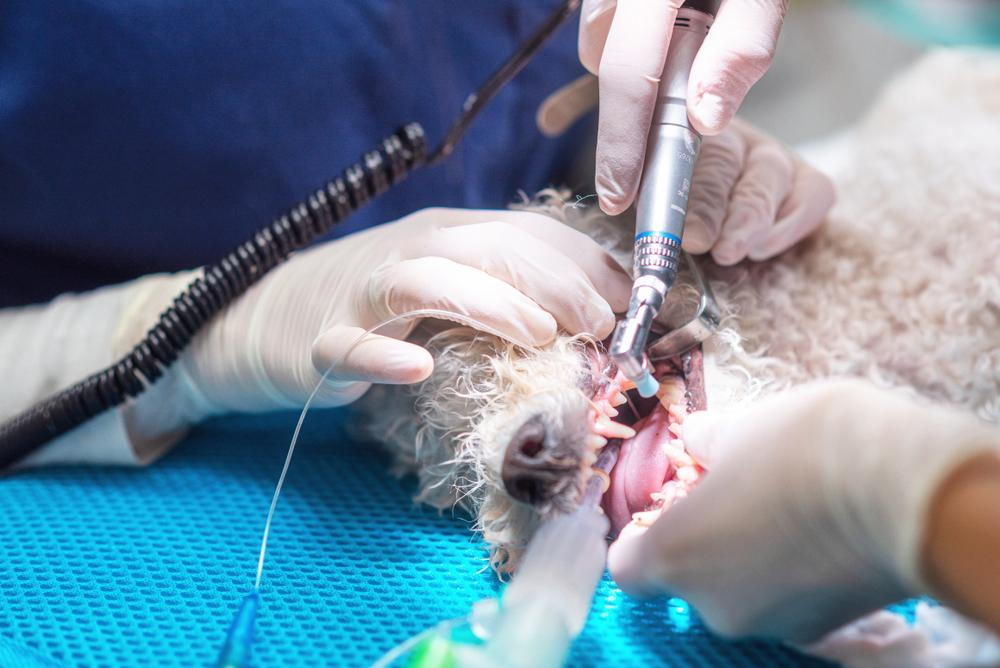Regular dental care is just as important for your pet as it is for you. Unfortunately, they can’t brush and floss their own teeth, so professional cleanings are crucial for maintaining your pet’s oral health, but how often does your pet need to have their teeth cleaned? While no one-size-fits-all professional veterinary dental cleaning schedule exists, our Sarasota Animal Medical Center team explains how we take each pet’s characteristics, such as age, breed, and lifestyle, into consideration when determining the right dental cleaning frequency for your furry pal.
Professional dental cleaning frequency for your pet
For most healthy adult pets, an annual professional dental cleaning is a good starting point. This allows our veterinarians to thoroughly examine pets’ mouths, remove plaque and tartar buildup, and treat potential issues before they progress. However, just like people’s, pets’ dental care needs vary, and several factors can influence the frequency at which your furry pal should have professional cleanings:
- Life stage — Your pet’s age often dictates the frequency at which they should have professional dental cleanings. When determining your furry pal’s professional dental cleaning frequency, our team always considers your pet’s age:
- Young pets — Kittens and puppies don’t need professional cleanings until their adult teeth have fully erupted, usually at around a year old. However, watch for dental problem signs, such as bad breath, discolored teeth, or difficulty chewing, which warrant a vet visit.
- Adult pets — Annual professional dental cleanings are standard for healthy adult pets. This may change with age. Senior pets, around 7 years and older, are prone to dental issues because of the years of wear and tear on their teeth. Senior pets may require more frequent cleanings to prevent gingivitis and periodontal disease, which can lead to pain and tooth loss and may even impact their overall health.
- Breed — Certain breeds are predisposed to dental problems because of their unique facial structures or genetics. These pets often require frequent cleanings:
- Small breeds — Cats and small dogs often have crowded teeth, making them susceptible to plaque buildup. This sticky bacterial film can harden into tartar, irritating the gums and causing inflammation or gingivitis. These pets may benefit from biannual cleanings to prevent dental issues from progressing.
- Flat-faced (i.e., brachycephalic) breeds — Flat-faced breeds, such as pugs, bulldogs, and Persian cats, have shortened airways and jaw structures that can impact their oral health. These anatomical differences can make cleaning their teeth difficult and increase their dental disease risk. Brachycephalic pets may need cleanings every six to 12 months to manage their unique oral hygiene needs.
- Lifestyle — Our veterinary team also considers your pet’s lifestyle to determine the frequency at which they should have professional dental cleanings. Diet and chewing habits can influence how often your pet needs professional cleanings:
- Chewing habits — Pets who love to chew hard toys or bones help keep their teeth somewhat clean naturally. However, aggressive chewers can damage their teeth, requiring more frequent professional attention to address any potential fractures or wear and tear.
- Overall health — Underlying health conditions can impact your pet’s dental health and cleaning frequency requirements. Pets with diabetes, immune system disorders, or other chronic illnesses may require more frequent cleanings than healthy pets to manage their oral health effectively. These conditions can weaken a pet’s immune system, making them susceptible to infections and complications from dental problems.
Recognizing poor dental health signs in pets
While routine checkups are crucial, knowing dental problem signs helps you determine when your pet needs veterinary intervention. Your pet likely has dental disease if they exhibit these signs:
- Bad breath — Chronic bad breath or halitosis indicates oral bacterial overgrowth, often attributable to plaque and tartar buildup. This buildup creates a bacterial breeding ground that produces foul-smelling compounds, causing halitosis.
- Discolored teeth — Yellow or brown tartar buildup on teeth are visible signs indicating that plaque and mineral deposits have hardened over time. Bacteria and food debris adhere to plaque, the sticky film on teeth. When plaque builds up and hardens, you cannot remove it through toothbrushing. These deposits not only affect teeth’s appearance but also irritate the gums and contribute to inflammation.
- Red, swollen, or bleeding gums — Healthy gums are pink and firm. If your pet’s gums are inflamed, red, swollen, or bleeding, they likely have gingivitis, an early gum disease stage. If left untreated, gingivitis can progress to serious periodontal disease, which can lead to tooth loss and impact your pet’s overall health.
- Difficulty chewing or eating — Dental disease pain or discomfort can make chewing and eating difficult for your furry pal. Observe if your pet hesitates to pick up kibble in their mouth, drops food, chews only on one side of their mouth, or seems to be in pain while eating. These behaviors can indicate loose teeth, exposed nerves, and other dental issues that cause discomfort.
- Excessive drooling — Excessive drooling is often an oral pain sign. Drooling can be a way to soothe pain or remove debris, but keep in mind that excessive drooling can also indicate other health issues.
- Pawing at their mouth — Pawing, rubbing, or excessive licking at the mouth can indicate pain, irritation, or discomfort. Similar to drooling, this behavior can be a way to alleviate discomfort. However, your veterinarian must rule out other potential causes such as allergies or injuries.
To promote your pet’s health, you need to ensure they receive at-home dental care and professional veterinary dental exams and cleanings. Schedule your furry pal’s exam with our Sarasota Animal Medical Center team and ensure your pet’s smile stays healthy and happy.

